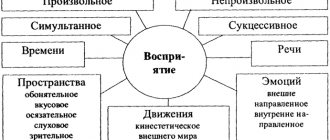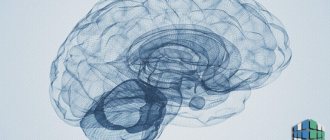The human psyche is an eight-dimensional mechanism
Psyche is a systemic property of highly organized matter, which consists in the subject’s active reflection of the objective world, in his construction of a picture of the world that is inalienable from him, and self-regulation on this basis of his behavior and activities.
2 25635 June 22, 2013 at 00:54 Author of the publication: Diana GADLEVSKAYA, anesthesiologist.
Psyche - the strings of our soul
There are a great many definitions of the concept “psyche”. Medicine, philosophy, psychology and even religion give their own definition of the psyche, explaining in their own way the mechanisms of a person’s inner world.
The most common is the definition of A. N. Leontiev:
Psyche is a systemic property of highly organized matter, which consists in the subject’s active reflection of the objective world, in his construction of a picture of the world that is inalienable from him, and self-regulation on this basis of his behavior and activities.
Like any property, the psyche manifests itself only in the process of interaction of this “highly organized matter” with other similar matters, that is, the human psyche manifests itself in society, among its own kind.
Each of us builds our own picture of the world and the image of ourselves in it and, on the basis of this, changes our behavior, makes decisions and performs certain actions to satisfy our own needs.
If the psyche is a reflection of reality, then why are there so many variants of this reflection? We can look at the same object and see completely different things. To understand life situations and the actions of other people in completely different ways, to draw diametrically opposed conclusions and to take actions that are inexplicable, sometimes even to oneself.
What bricks do we use to build our pictures of the world? What do we bring to the fore and what do we leave in the background? And why do we act this way and not otherwise? What motivates us to make decisions?
Through the octagonal prism of systems thinking, the mechanisms of functioning of the human psyche become visible.
Yuri Burlan, at the “System-Vector Psychology” training, describes the principles according to which we reflect objective reality and build our picture of the world, determine our place in existing society and regulate our behavior and actions.
Any human mental processes are determined by its vectors. Each vector simultaneously means the presence of a set of desires, aspirations, goals and, at the same time, the presence of the properties necessary for their implementation. Each action is conditioned by a corresponding desire and provided with a specific property. We simply cannot wish for what we cannot achieve. All our desires and possibilities completely coincide with each other.
In the days of the primitive human pack, everything was simple - everyone, with rare exceptions, had one vector, one specific species role, by performing which the person felt pleasure and received satisfaction from his life. The species role was a separate part of the overall task of survival of the entire flock. Only the flock where all species roles were fulfilled had the opportunity to survive and continue itself in time.
Today, the development of humanity has reached such a level that each modern individual has on average 3–5 vectors or more, in connection with this, the human psyche has become significantly more complex, and mental processes have accelerated significantly. Despite this, in each vector all the previous desires are present, as at the dawn of humanity, only the methods of their implementation have changed.
The one who previously guarded the cave and taught the boys war and hunting is now teaching at a university or doing analytics. The one who hunted and created food supplies designs and improves technology. Those who admired the sunset and looked out for dangerous predators in the savannah are engaged in art or medicine.
However, we are all united by one common principle, one desire that is inherent in all people, regardless of the vector set.
The pleasure principle
What do we want? All without exception!
Love, wealth, respect, fame, attention, peace?.. The answer is simple: absolutely everything - we want pleasure. We strive to enjoy our lives, all our actions are aimed only at this.
Each of us has an innate set of vectors - a set of psychological properties that determine our desires, values, and priorities. By realizing our desires, we receive pleasure as a result of balanced brain biochemistry, we feel fullness of life, satisfaction from our own actions, and happiness.
The lack of fulfillment of natural needs leads to the accumulation of deficiencies, an imbalance in the biochemistry of the brain and the emergence of negative mental states - apathy, depression, fears, phobias, resentments, irritability, aggressiveness and the like. Such negative states force us to be filled in any way, even archetypal, just to relieve the growing tension.
We all strive for pleasure, but not for suffering - this is what pushes us to action. And we can get the greatest pleasure by maximizing our qualities at the highest level of their development according to the temperament of a modern person. Each of the eight vectors has its own desires, and, accordingly, people with different vectors receive pleasure from different types of activities.
The psyche of a leather worker is such that he will gladly save time by doing several things at the same time. Analnik, on the contrary, will strictly consistently bring his work to the ideal without regard to the time and effort expended. The urethral is always in the forefront of moving his flock into the future, no matter what the cost, and for the muscleman the concepts of space and time merge in his favorite state of monotony, in the joy of physical labor.
We are born for pleasure, which we can receive only by realizing our own qualities, that is, fulfilling a species role. In this way, we benefit society and make our contribution to the development of all humanity.
The private pleasure of each of us is actually much larger and more significant than just the personal joy of a job well done.
Doubling principle
The implementation of vector properties is a constant process. It is impossible to fill up once and for all, just as it is impossible to eat enough for several days in advance. However, by performing the same actions, realizing our desire at the same level, over time we find that the feeling of fullness decreases. What's the matter?
Conquering the same peak no longer brings the climber that intoxicating feeling of joy as it did for the first time. Now we need a higher rock.
“The only thing better than mountains are mountains that you haven’t been to yet...” Vladimir Vysotsky, as always, accurately noted.
Each desire in each vector requires its satisfaction. Partial fulfillment causes a thirst for more complete realization, and a fully realized desire gives rise to a double one. After the complete realization of one need, a new one arises, twice as large and requiring double the effort to fill, but ultimately giving double pleasure.
Life is movement: effort on oneself, work of thought, creative search, creative activity, a kind of self-improvement, spiritual growth without stopping along the way.
Someone is rapidly moving up the career ladder, someone becomes a top-class professional, and someone, being a top model, creates a charitable foundation to help children. This is the fulfillment of a growing desire in the visual vector - from the modeling business, where for complete satisfaction it is enough to see “your beautiful self” on the cover of a magazine, to charity, in which only giving of everything is possible - your time and effort, emotions, love and compassion, and the pleasure from such a realization is many times greater.
Of course, such growth is only possible with an initially highly developed vector. Implementation directly depends on the level of development of vector properties. The higher the level of development, the more complex and voluminous the implementation and the more pleasure a person can receive.
Desire “inward”, desire “outward”
Filling vectors is possible in two ways: inward, which means receiving satisfaction directly into oneself, this happens at a low level of vector development, and outward, that is, for the benefit of all humanity, society, the collective, and then oneself as a member of this society. Giving for the sake of receiving, creation for the sake of acquisition and pleasure.
Realization within, for oneself, for one’s loved one, is the archetypal elementary level of the psyche at which our desires can be satisfied. It gives small short-term pleasure, which means it requires constant repetition in order to fill the gaps at least partially.
The archetypal implementation of the skin getter is theft, that is, extraction at any cost, enriching oneself at the expense of others, while the highly developed skin vector is filled through engineering or lawmaking: this is obtaining the same property and social superiority, only by increasing one’s own value as a specialist, increasing their contribution to the development of society, creating social benefits.
The complex psyche of modern man is much more than the minor filling from the implementation of a primitive program. An adult will not get as much pleasure from playing with dolls as from working on a complex project in a team.
The strength of desire in each vector (or temperament) of modern people grows with each new generation, therefore, the determining factor in a person’s life scenario is the answer to the question: how high the properties of vectors can develop before puberty. The two poles of the skin vector are either a notorious swindler, thief and rogue, or a talented design engineer, organizer, economist.
Any of the eight vectors is only a set of properties, desires, values and priorities, and in what way we realize them - our place in society and the amount of pleasure from realization depends on this.
Realization outward requires more effort, but at the same time it gives the most complete satisfaction from life, since it is fulfillment at the highest level, which, in fact, corresponds to the level of temperament of a modern person.
Happy reflection in the mirror
We can create a picture of the objective world based on our own vision of reality, understanding what is most important and valuable for each of us, and what is of secondary importance. Our view of the world and our place in it are determined by our vectors. The tools of activity of the psyche of a modern person are the innate temperament, the level of development and the degree of realization of natural qualities. And the mechanisms of functioning of the psyche are the principle of pleasure, doubling desire and realization inside or outside.
The psyche is the most complex and multifaceted property of a modern person, and the more you know about the principles of functioning of the psyche, the more you understand yourself, your desires and capabilities, the more chances you have to make yourself happy, and not by a third or half, but by 100 %.
Proofreader: Anna Sorokina
Author of the publication: Diana GADLEVSKAYA, anesthesiologist.
The article was written based on materials from the training “System-vector psychology”
Highly organized matter
The nervous system is a complex, living structure made up of billions of elements. In the process of biological evolution, a change in the structure of connections between elements led to the formation of a unique organ capable of not only perceiving the surrounding world, but also coordinating the actions of other organs that influence the existence of the organism.
These processes include: breathing, vision, hearing, reproduction, movement. The nervous system is also capable of organizing, retrieving, and storing information about past experiences as needed. An equally important ability is to anticipate changes in life conditions.
A high level of organization of the nervous system is manifested in the ability for self-development and evolution. The development of an individual occurs from birth to death. In the mind of an individual, the image of the world is not just a decoration with unfolding life events. An individual approach and selectivity are manifested in the behavior with which the carrier satisfies needs.
Structural representation
In psychology, there are three large groups of psychological phenomena that make up the structure of the psyche: mental states, processes and properties.
A mental process is a phenomenon manifested in the form of a reaction, which has a beginning, development and ending. Irritations come from both external sources and the internal environment of the body.
Mental processes are divided into cognitive, emotional and volitional:
- The cognitive category includes thinking, perception, memory, sensation, speech, imagination.
- Emotional ones include feelings of lower and higher order, mood, state of stress, frustration, affect.
- Volitional qualities determine consciously set goals, accepted intentions, attitudes, needs, and motives.
Mental states are stable phenomena caused by the impact of events in internal and external life on a person. The individual is usually aware only of the condition, and the factor that caused it is not clearly defined.
There are states:
- General - vivacity, joy, apathy, anxiety, interest, activity, relaxation, etc.
- Emotional - anger, sadness, irritability, joy.
- The creative state is inspiration.
- States of frustration, affect.
Mental properties are a feature inherent in people. Stable phenomena determine the qualitative and quantitative level of life activity and are characteristic of a particular person.
The characteristics of mental properties are presented in several directions:
- A person’s life position: needs, interests, beliefs, ideals. All these phenomena determine the level of human activity.
- Temperament type is the natural qualities of a person. Balanced, agile, slow, strong.
- Character traits - belief system, behavior, etc.
A person’s mental education is the characteristics acquired by an individual in the process of professional and life experience. A person is characterized by several manifestations: knowledge, skills, abilities, habits, views, attitudes, beliefs.
Self-regulation of behavior
Behavior is understood as a consistent system of purposeful actions. Implementation occurs in the form of a unity of executive, external and mental actions that bring the body closer or further away from certain objects. The information obtained allows subjects to regulate behavior and activities.
Behavior is the external action (utilitarian contact) of a living being with the elements of the environment on which its life will depend. Any behavioral act is carried out as an interconnection of the work of incentive, regulatory, reflective and executive mechanisms. From which it follows that the psyche is the property of a high level of matter (brain) to manifest itself in the life of an individual. Its work is based on the processes of the nervous system, which are influenced by both the external environment and the consequence of the body’s own activity.
As a result, a subjective picture of the world is formed in the mind, including both the subject himself and the mechanisms of self-regulation.







